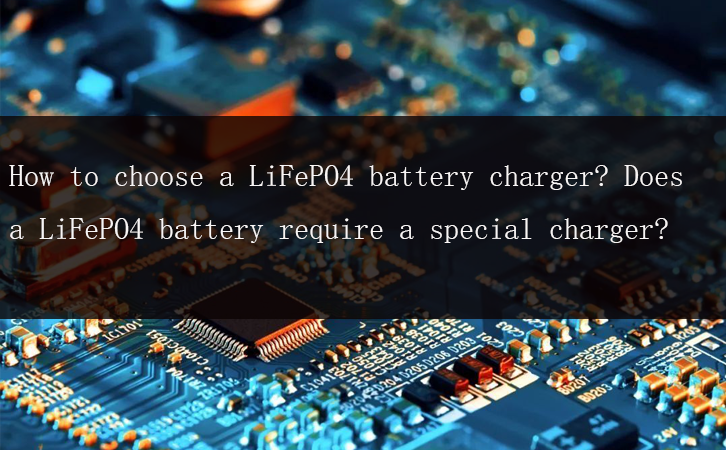How to choose a LiFePO4 battery charger? Does a LiFePO4 battery require a special charger?
Published:2024-09-29 16:27:31 Author:超级管理员 Views:68
When selecting a LiFePO4 battery charger, it is important to choose one based on the battery's capacity and rated voltage. Generally, it is recommended to choose a charger with a capacity ranging from one-third to one-half of the battery's capacity and a voltage that matches the battery's rated voltage.
LiFePO4 batteries are a new type of battery that offer advantages such as high energy density, long life, and good safety compared to traditional lead-acid and nickel-metal hydride batteries. They are widely used in electric vehicles, solar energy storage systems, and other fields. To ensure the long-term stable operation of LiFePO4 batteries, it is essential to use the correct charger for charging.
First, let's understand the charging principle of LiFePO4 batteries. These batteries require two stages of charging: constant current (CC) and constant voltage (CV). During the CC stage, the battery voltage rises continuously until it reaches a certain level, at which point it enters the CV stage. In the CV stage, the charging current gradually decreases, and when the current falls to a certain level, it indicates that the battery is fully charged, and the charger automatically stops charging. Therefore, when charging a LiFePO4 battery, it is necessary to use a dedicated charger to ensure proper charging.
When selecting a LiFePO4 battery charger, the first consideration should be the battery's capacity and rated voltage. It is recommended to choose a charger with a capacity ranging from one-third to one-half of the battery's capacity and a voltage that matches the battery's rated voltage. For example, if your LiFePO4 battery is 48V 20Ah, a charger with an output voltage of 54.6V and an output current of 6A would be a suitable choice. Additionally, when using the charger, it is important to ensure that the battery's voltage and current are compatible with the charger, and that the charger meets quality standards. To maximize the battery's lifespan, it is best to choose a high-quality charger.
In conclusion, selecting the right charger is crucial for using LiFePO4 batteries. Not only can it effectively protect the battery's lifespan, but it also ensures that the battery is fully charged for optimal use.
Are LiFePO4 battery chargers interchangeable with lithium-ion battery chargers?
I. Differences between LiFePO4 Batteries and Ordinary Lithium Batteries
LiFePO4 (Lithium Iron Phosphate) batteries are a new type of rechargeable battery that boasts advantages such as high safety, long lifespan, and high-temperature stability compared to traditional Lithium Cobalt Oxide (LiCoO2) and Nickel-Metal Hydride (Ni-Mh) batteries. However, there are differences between LiFePO4 batteries and ordinary lithium batteries in terms of charging methods, charging voltages, and charging currents.
II. Reasons for Not Mixing Chargers Arbitrarily
Due to the differences in charging methods between LiFePO4 batteries and ordinary lithium batteries, using the wrong charger can lead to overcharging or undercharging of the battery, resulting in malfunction or even safety accidents. Therefore, chargers should not be mixed arbitrarily.
III. Types of Chargers That Can Be Used and Precautions
Dedicated Chargers: It is recommended to use chargers specifically designed for LiFePO4 batteries to fully maintain battery lifespan and safety.
Common Chargers: If using a regular lithium-ion battery charger, adjustments should be made based on the characteristics of the LiFePO4 battery. For example, the charger voltage should be adjusted according to the battery's voltage requirements, typically ranging from 3.2V to 3.6V. Additionally, the charger current should be adjusted to one-third of the battery's rated current value to prevent overcurrent damage.
Inapplicability of Common Chargers: Chargers previously used for other types of lithium batteries or chargers for mobile phones, tablets, etc., should not be used as they may not meet the voltage and current stability requirements of LiFePO4 batteries, leading to overcharging or undercharging.
Precautions During Charging: To avoid damaging the battery, it is essential to prevent overcharging and over-discharging during the charging process. Additionally, the charger should be placed in a well-ventilated area to prevent overheating and potential safety hazards.
In summary, to ensure the safety and lifespan of LiFePO4 batteries, it is crucial to use the appropriate chargers and strictly follow relevant usage and maintenance requirements during charging.
When choosing LiFePO4 battery charger, you should choose a professional LiFePO4 battery charger manufacturer with production capacity.
IntroductionGolf carts serve as vital transportation tools on golf courses, and their performance and reliability are crucial for enhancing player experience an···
The battery pack is the heart of a golf cart, silently powering every acceleration and climb on the green. However, battery degradation often goes unnoticed, mu···
The battery pack is the heart of a golf cart’s power system, yet maintaining it has long been a challenge for technicians. Traditional troubleshooting methods—···
For golf course managers, ensuring smooth and efficient operations is crucial for providing a memorable experience for golfers and maintaining the reputation of···





